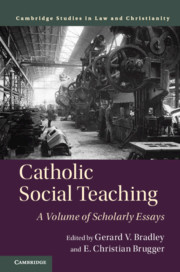Book contents
- Catholic Social Teaching
- Law and Christianity
- Frontispiece
- Catholic Social Teaching
- Copyright page
- Dedication
- Contents
- Contributors
- Acknowledgments
- Abbreviations
- Introduction Contingency, Continuity, Development, and Change in Modern Catholic Social Teaching
- Part I Historical Background
- Part II Leo XIII to Francis: The Documentary Tradition
- Part III Themes in Catholic Social Teaching
- 10 Catholic Social Teaching on the Common Good
- 11 The Universal Destination of the World’s Resources
- 12 The Apostolate of the Laity
- 13 Globalization
- 14 Are Some Men Angels? Modern Catholic Social Thought and Trust in Government
- 15 The Moral Principles Governing the Immigration Policies of Polities
- 16 International Finance and Catholic Social Teaching
- 17 Subsidiarity
- 18 Socialism and Capitalism in Catholic Social Thought
- 19 The Preferential Option for the Poor and Catholic Social Teaching
- 20 Catholic Social Teaching and Living the Christian Life
- Part IV Evaluative and Critical Reflections
- Bibliography
- Index of Names and Subjects
- Index of Ecclesiastical Texts
16 - International Finance and Catholic Social Teaching
from Part III - Themes in Catholic Social Teaching
Published online by Cambridge University Press: 12 July 2019
- Catholic Social Teaching
- Law and Christianity
- Frontispiece
- Catholic Social Teaching
- Copyright page
- Dedication
- Contents
- Contributors
- Acknowledgments
- Abbreviations
- Introduction Contingency, Continuity, Development, and Change in Modern Catholic Social Teaching
- Part I Historical Background
- Part II Leo XIII to Francis: The Documentary Tradition
- Part III Themes in Catholic Social Teaching
- 10 Catholic Social Teaching on the Common Good
- 11 The Universal Destination of the World’s Resources
- 12 The Apostolate of the Laity
- 13 Globalization
- 14 Are Some Men Angels? Modern Catholic Social Thought and Trust in Government
- 15 The Moral Principles Governing the Immigration Policies of Polities
- 16 International Finance and Catholic Social Teaching
- 17 Subsidiarity
- 18 Socialism and Capitalism in Catholic Social Thought
- 19 The Preferential Option for the Poor and Catholic Social Teaching
- 20 Catholic Social Teaching and Living the Christian Life
- Part IV Evaluative and Critical Reflections
- Bibliography
- Index of Names and Subjects
- Index of Ecclesiastical Texts
Summary
Modern Catholic social teaching, especially as articulated by the popes, the curia, and the bishops, has said little directly and formally about systems of finance. Where these voices have spoken, they have encouraged sound practices in broad outline and criticized obviously unsound and immoral behaviors. Unfortunately, their own financial management practices have not offered good models for what might be done. Nevertheless, key concepts like the logic of gift, the idea of solidarity and the common good, and the vision of integral human development, coupled with the competence and integrity of Catholics working in systems of finance, can imagine possibilities and generate inspiring models of professional conduct. The key to making this work well is to understand and embrace the possibility of pursuing work in the system of finance as a genuine Christian vocation that in its own way genuinely addresses human needs and helps to build the Kingdom of God. In service of this, the pastors of the Church at every level can and should affirm this profession as a vocation, encourage Catholics to bring their faith to their work, avoid unnecessary criticism of business practices, and assist business professionals to see more clearly the challenges and possibilities they face.
- Type
- Chapter
- Information
- Catholic Social TeachingA Volume of Scholarly Essays, pp. 387 - 413Publisher: Cambridge University PressPrint publication year: 2019

